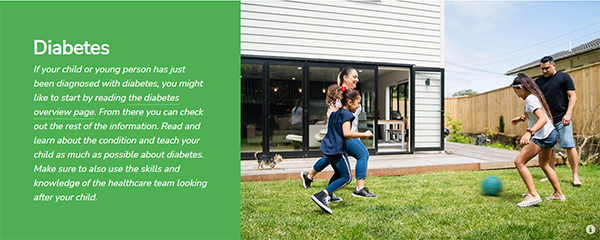Key points about growing up and diabetes management
- as a child or young person with diabetes grows and develops, what they know about diabetes and how they manage it also changes
- helping children and young people with diabetes to move towards self-management has 3 key parts: having knowledge, having skills, having support
How does understanding of diabetes develop as my child grows up?
As a child or young person with diabetes grows and develops, what they know about diabetes and how they manage it also changes. This growth and change is a gradual process and can also depend on how long a person has had diabetes. One part of this change is diabetes knowledge:
- how a child or young person understands what diabetes is
- how it affects them and those close to them
- how to manage it
How might a 5-year-old understand their diabetes?
A 5-year-old may know that they have diabetes, that they need to eat at certain times and that they need to have insulin to stay well.
How might a 12-year-old understand their diabetes?
A 12-year-old will know more about how their body works and how diabetes can affect them. They will understand it is important to carry supplies with them all the time, and that certain foods and exercise affect glucose levels.
How might a 14-year-old understand their diabetes?
A 14-year-old is more likely to understand the social implications of having diabetes. As well as understanding the things a 5 and 12-year-old understand, a 14-year-old is likely to be able to understand the basics of carbohydrate counting and the importance of adjusting insulin to prevent hypoglycaemia and treat hypoglycaemia.
How can my child develop diabetes management skills?
Another part of this growth and change is the development of diabetes skills. Just as we expect a typical 12-year-old will have better coordination and physical abilities than a 5-year-old, there are different expectations of a 5-year-old with diabetes, a 12-year-old with diabetes and a teenager with diabetes.
What diabetes management skills might a 5-year-old have?
A 5-year-old with diabetes may do their glucose check but not understand the result or inject insulin.
What diabetes management skills might a 12-year-old have?
A 12-year-old who has had diabetes for some time will probably have the skills to carry out a glucose check, read and understand the result, recognise when they are high or low, and inject insulin. But, they may not be able to adjust insulin doses.
What diabetes management skills might a 14-year-old have?
A 14-year-old who has just been diagnosed with diabetes may have the ability to carry out glucose checks and recognise the importance of taking insulin, but still be learning how to give an insulin injection and adjust insulin doses. .
How can I support my child living with diabetes?
Having support makes a difference - someone to encourage, remind, praise.
Knowing that it is important to get regular exercise and having the ability to do this, doesn't mean that we always exercise. Even if a child or young person has the 'knowledge' and 'skills' to do a diabetes management task, they still may not do them for a range of reasons. That's why it is important to have support to remind them, encourage them, and praise them.
Support from someone close (especially parents or caregivers) is essential in having good diabetes management
People of all ages with diabetes need support and encouragement. For young people, this is even more essential. This is because of all the other pressures of growing up including puberty, school, and peer challenges. Having diabetes can be annoying. Having someone who can understand this and stay positive and encouraging has been proven to help young people with overall diabetes control.
Young people with diabetes may need supervision as well as support
The support and encouragement needed depends on a young person’s age and stage. When a person with diabetes is younger, or newly diagnosed, they may need supervision as well as support. They need someone to remind and help them with:
- glucose monitoring and interpreting the results
- making decisions around food and exercise
- making insulin adjustments
- giving injections
When a person with diabetes is really struggling to carry out any diabetes management tasks, then they may need extra supervision and support to help share the burden of living with a 24-7 condition. This might include:
- reminders about glucose monitoring and injections
- making decisions about insulin doses
- helping with carbohydrate counting and food decisions
- having a listening ear when they want to talk about how annoying diabetes is
When will my child move towards self-management of their diabetes?
Self-management is an ongoing process that starts as soon as a person is diagnosed with diabetes and continually develops over time. There is no defined age for a person to 'self-manage', and parents and support people are essential through each developmental stage.

The diabetes team can provide information and teach skills for managing diabetes for children and young people with diabetes as well as their parents and others who look after them and support them.
Please contact your local diabetes team if you would like further information on this or other ways to support your child or young person with diabetes as they move through the stages of childhood to adolescence.
You may find the general information in the KidsHealth parenting teens section useful.
See more KidsHealth content on diabetes
Check out KidsHealth's section on diabetes

Acknowledgements
The content on this page has been produced in collaboration with the National Clinical Network Children and Young People's Diabetes Services.
The diagram is reproduced from:
Markowitz JT, Garvey KC, Laffel LM. Developmental changes in the roles of patients and families in type 1 diabetes management. Curr Diabetes Rev. 2015;11(4):231–238.
